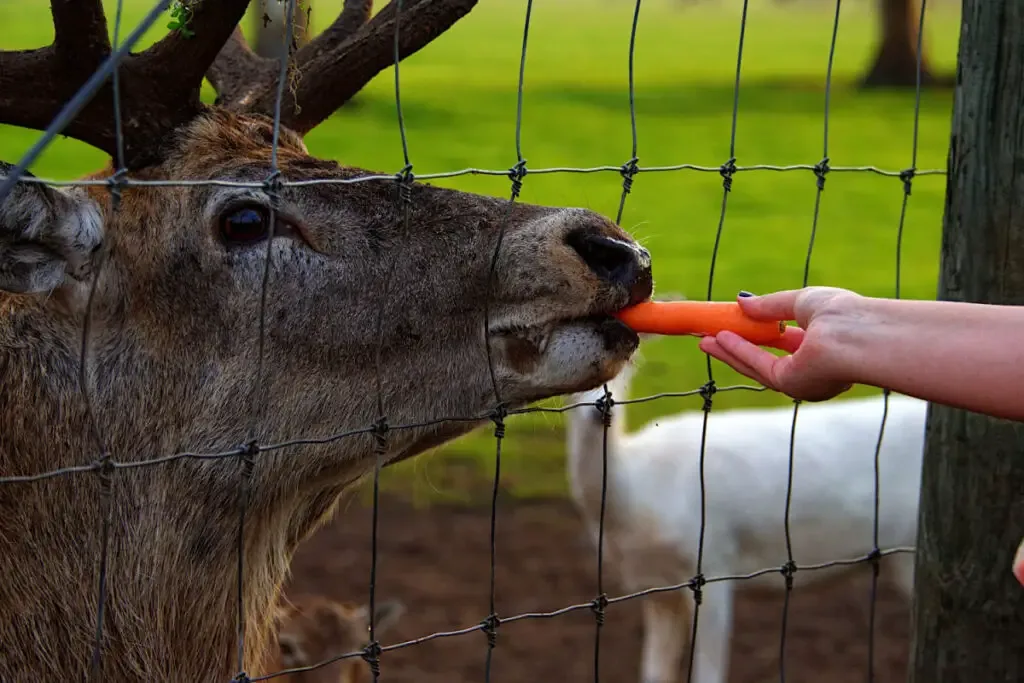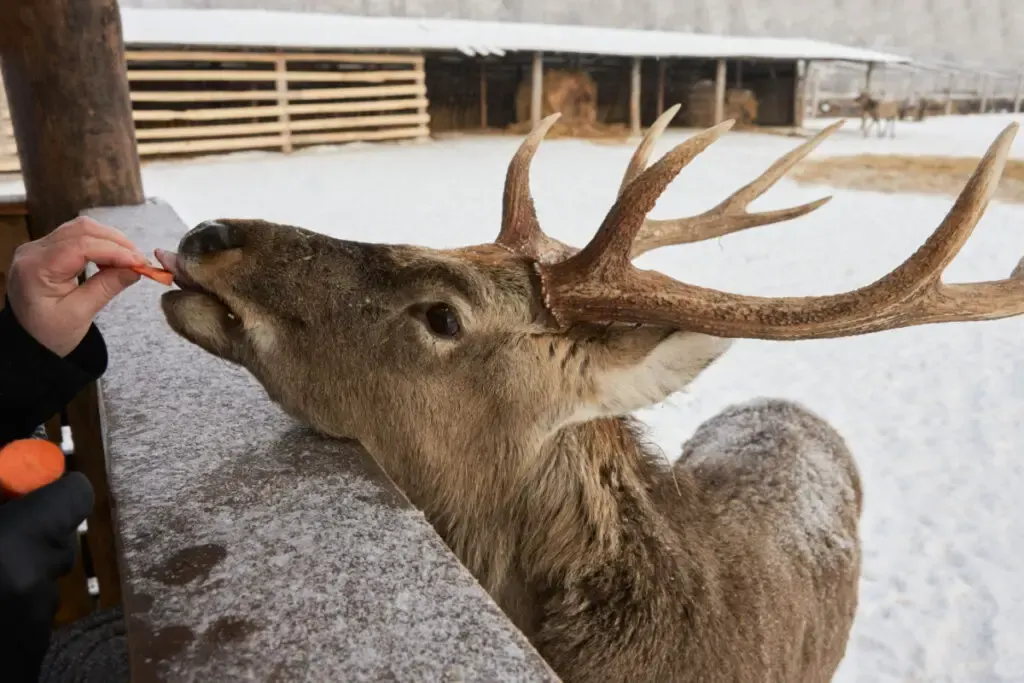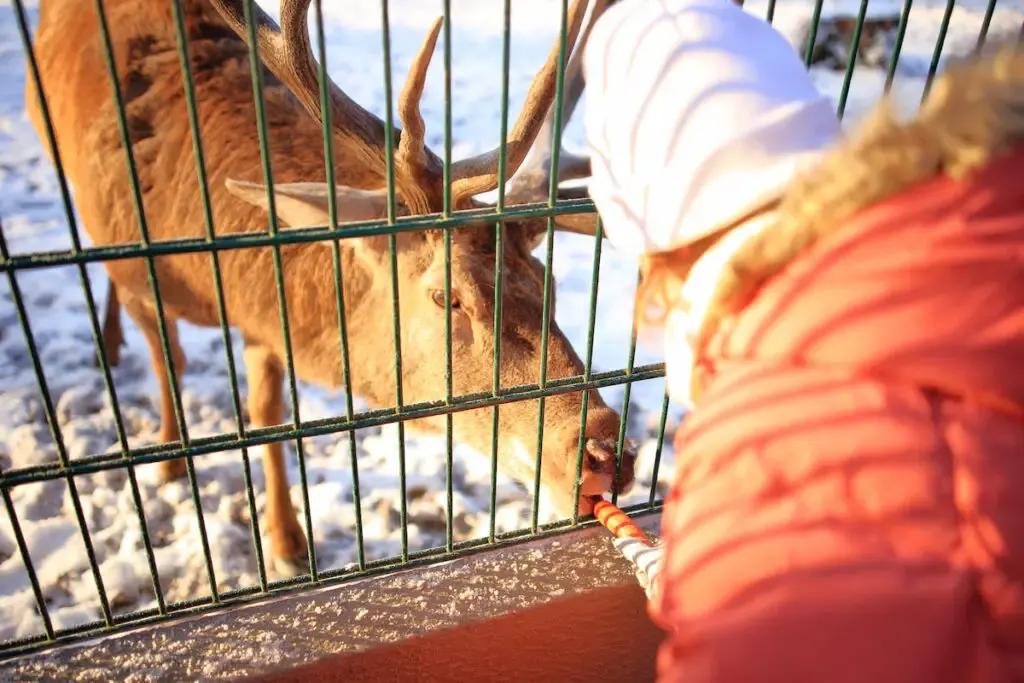A lot of people are interested in what deer eat because we want to know what makes them tick. Gardeners are curious about what deer love to eat so they can best protect certain vegetables or flowers from grazing deer at night.
Hunters research deer dietary habits so they can set better traps and lure them in faster. Whatever your purpose is, understanding what deer love to eat and where they go looking for food will give you good insight into deer behavior and what to expect.
One thing people ask a lot is whether deer eat carrots. One thing that surprises folks who live out in the suburbs or even further out is that, during the winter, their snowman’s nose usually goes missing after a day or two.
That’s because deer love eating carrots! They’re also taking food wherever they can find it during the winter. Carrots are a delicious treat for deer. They’ll eat the entire thing, leaves and all.

When it’s cold outside, deer have a harder time grazing for things than they do in the spring or summer. Root vegetables that grow underground and last a bit longer than things on the surface provide good meals when food is scarce.
If you’re curious about what deer can eat, here is some information on things they may find tempting enough to draw them to your backyard.
Table of Contents
Why Deer Love Carrots So Much
It’s pretty rare to hand feed a deer, so you won’t meet too many people who have had the experience of feeding a deer carrots.
However, lots of people love feeding carrots to horses, cows, goats, and other domestic animals. The response is typically the same. Animals love eating carrots and it’s easy to understand why.
There’s the satisfying crunch, the high water content that coats the mouth so well, and the strong flavor. Animals aren’t accustomed to eating a lot of sugar in their diets, so a carrot is almost like a dessert to them.
Deer love carrots for many of the same reasons. Usually, deer are out in the wild eating hardwood twigs.
Does that sound appealing? They also eat a lot of pine needles in the winter. Not exactly foods that pack a flavor punch. If they come across a carrot, they’ll gobble it up in seconds.

Can Deer Eat Raw/Cooked Carrots?
Odds are, raw carrots constitute the majority of carrots deer consume. Whether the carrots they eat are wild carrots or in someone’s vegetable gardens, they aren’t likely to come across a lot of cooked carrots.
Can they eat cooked carrots? Well, cooked carrots don’t represent any sort of health hazards for deer. They have very strong stomachs. If you’re thinking about using the leftover boiled carrots as bait for deer while you’re on your next hunt, it will probably work just fine.
Deer will smell it from a mile away. They might not like cooked carrots as much as raw carrots, but take a look at their normal diet and you’ll understand why they still love eating them.
Natural Deer Diets Are Important
Deer, like many wild animals, rely on strong microorganisms in their guts to stay healthy.
Remember, they are out in the wild drinking from unclean water sources and eating all sorts of foods from questionable sources. They need to keep their stomachs, immune systems, and digestive tracts strong.
Straying from their natural diet can make deer sick. That’s why wildlife experts stress so strongly that people shouldn’t feed deer or any other wild animals.
Deer, because their food can be so scarce, can quickly become reliant on well-intentioned humans for food. If you keep putting out food, they’ll keep coming back. Sooner or later, they’ll get sick and could die.

What Deer Love to Eat in Your Garden
Of course, not everyone’s feeding deer carrots. Sometimes the deer take what they want without asking. If you ask any suburban gardener, they can probably tell you a story or two about what a challenge it is to keep deer out.
They eat flowers like nobody’s business and will make their way into your vegetable garden because they’d rather be there than out eating pine needles.
White-tailed deer love eating tomatoes. Tomato plants are an easy plant that a lot of beginners choose as one of their first vegetables. Losing some almost-ripe tomatoes to deer while you’re sleeping can be very discouraging.
Deer, of course, also like to eat things like strawberries, blackberries, blueberries, etc. These are high-sugar foods that have the calories a deer needs to fatten up with before winter.
They’re also known to take chunks out of apples either on the tree or ones that have recently fallen to the ground. If you’re growing any sort of lettuce, bok choy, cabbage, etc., you can expect those to be a target as well.
Keeping Deer Out of Your Garden
Fencing will only go so far in keeping deer out. If you’ve seen them in the wild, you may have had the chance to watch them jump over a road or even a passing car.
Deer can jump very high, and they will probably make a mockery of any fence that isn’t at least five or six feet tall.
You need to build higher fences and position your garden in such a way that it’s very difficult to get to.
Deer don’t love going down flights of stairs, so that’s something to keep in mind. You may also want to install gates on any steps that lead into your yard from a driveway.

Laws Sometimes Prohibit Deer Feeding
If you’re feeding deer, you may want to take a look at whether it is legal.
Some local ordinances make feeding deer and other wild animals punishable by fines and other punishments.
Authorities put these types of rules in place to protect the ecosystem but to also discourage deer from getting too close to roads, places where people live, and other important infrastructure.
When deer start associating people with a food source, then they become more comfortable.
They’ll start coming around more often and won’t react as quickly when cars drive by. They could also end up hurting someone who gets too close for a picture or tries to pet them.
